|
|
| |
|
| |

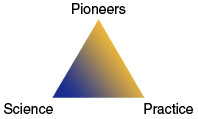
SpringerBriefs on
Pioneers in Science and Practice (PSP)
Edited by
Hans Günter Brauch
Free University of Berlin and AFES-PRESS
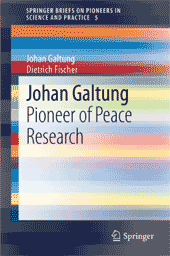 |
Vol. 5: Johan Galtung [Norway]: Pioneer of Peace Research. SpringerBriefs on Pioneers in Science and Practice No. 5 – presented by Dietrich Fischer [Switzerland] (Heidelberg – New York – Dordrecht – London: Springer, 2013).
ISBN (Print): 978-3-642-32480-2
ISBN (Online/eBook): 978-3-642-32481-9
DOI: 10.1007/978-3-642-32481-9
More on this book
Order Form/Product Flyer (Please download there)
Order this book on the Springer Website
Order electronic version and individual chapters |
On the author
On the editor
|
Book Announcements and Book Reviews
Book Presentations and Press Conferences |
| Congratulations to Johan Galtung’s 85th birthday |
| |
|
- It contains groundbreaking texts from the founder of this unique academic discipline
- It addresses an important field, peace studies (As Willy Brandt pointed out, “Peace is not everything, but without peace, everything is nothing”)
- It includes some of the most important contributions from Galtung’s 160 books and over 1600 articles
This is the first ever anthology of key articles by Johan Galtung, widely regarded as the founder of the academic discipline of peace studies. It covers such concepts as direct, structural and cultural violence; theories of conflict, development, civilization and peace; peaceful conflict transformation; peace education; mediation; reconciliation; a life-sustaining economy; macro-history; deep culture and deep structure; and social science methodology. Galtung has contributed original research, concepts and theories to more than 20 social science disciplines, including sociology, international relations and future studies, and has also applied his new insights in practice. The book is a valuable resource for researchers and practitioners, and can serve as a supplemental textbook for graduate and upper undergraduate courses in peace studies and related fields.
Content Level » Research
Keywords » Conflict Transformation - Johan Galtung - Mediation for Peace - Peace Research Institute - Peace Studies - Structural Violence - TRANSCEND Method |
| |
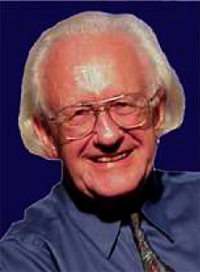
.
|
Johan Galtung, Dr. Dr hc mult, a professor of peace studies, was born in 1930 in Oslo, Norway. He is a mathematician, sociologist, political scientist and a pioneer of peace studies. He founded the International Peace Research Institute, Oslo (1959), the world’s first academic research centre on peace studies, and the Journal of Peace Research (1964). He has helped establishing dozens of other peace centres around the world.
He taught as a professor for peace studies at universities all over the world, including Columbia (New York), Oslo, Berlin, Belgrade, Paris, Santiago de Chile, Buenos Aires, Cairo, Sichuan, Ritsumeikan (Japan), Princeton, Hawai’i, Tromsoe, Bern, Alicante (Spain) and many others on all continents. He has motivated thousands of individuals to dedicate their lives to the promotion of peace and the satisfaction of basic human needs.
He has mediated in over 100 conflicts between states, nations, religions, civilizations, communities, and persons since 1957. His contributions to peace theory and practice include conceptualization of peace building, conflict mediation, reconciliation, nonviolence, theory of structural violence, theorizing about negative vs. positive peace, peace education and peace journalism. His unique imprint on the study of conflict and peace stems from a combination of systematic scientific inquiry with a Gandhian ethics of peaceful means and harmony. He has conducted research in many fields with his original contributions to peace studies, to human rights, basic needs, development strategies, a world economy that sustains life, macro history, the theory of civilizations, federalism, globalization, the theory of discourse, social pathologies, deep culture, peace and religions, social science methodology, sociology, ecology, and future studies.
He is author or co author of more than 1600 articles and over 160 books on peace and related issues, including Peace By Peaceful Means (1996), Macrohistory and Macrohistorians (with Sohail Inayatullah, 1997), Conflict Transformation By Peaceful Means (1998), Johan uten land (autobiography, 2000), Transcend & Transform: An Introduction to Conflict Work (2004, in 25 languages), 50 Years 100 Peace and Conflict Perspectives (2008), Democracy Peace Development (with Paul Scott, 2008), 50 Years - 25 Intellectual Landscapes Explored (2008), Globalizing God (with Graeme MacQueen, 2008), The Fall of the US Empire - And Then What (2009), Peace Business (with Jack Santa Barbara and Fred Dubee, 2009), A Theory of Conflict (2010), A Theory of Development (2010), Reporting Conflict: New Directions in Peace Journalism (with Jake Lynch, 2010), Korea: The Twisting Roads to Unification (with Jae-Bong Lee, 2011), Reconciliation (with Joanna Santa Barbara and Diane Perlman, 2012), Peace Mathematics (with Dietrich Fischer, 2012), Peace Economics (2012), A Theory of Civilization (forthcoming 2013), and A Theory of Peace (forthcoming 2013). In 2008, he founded the TRANSCEND University Press. 36 of his books have been translated into 33 languages, for a total of 134 book translations.
He is founder (in 2000) and rector of the TRANSCEND Peace University, the world’s first online Peace Studies University. He is also the founder and director of TRANSCEND International, a global non profit network for Peace, Development and the Environment, founded in 1993, with over 500 members in more than 70 countries around the world. As a testimony to his legacy, peace studies are now taught and researched at universities across the globe and contribute to peacemaking efforts in conflicts around the world.
He was jailed in Norway for six months at age 24 as a Conscientious Objector to serving in the military, after having done 12 months of civilian service, the same time as those doing military service. He agreed to serve an extra 6 months if he could work for peace, but that was refused. In jail he wrote his first book, Gandhi’s Political Ethics, together with his mentor, Arne Naess.
As a recipient of over a dozen honorary doctorates and professorships and many other distinctions, including a Right Livelihood Award (also known as Alternative Nobel Peace Prize), Johan Galtung remains committed to the study and promotion of peace.
|
| |
|
Important Links on Johan Galtung:
|
Selected Videos with Johan Galtung
|
| |
|
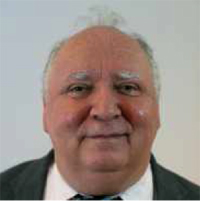 |
Dietrich Fischer, Prof. Dr. (1941-2015), Director, TRANSCEND University Press. From 2009-2012 he was Academic Director of the World Peace Academy, Basel. From 2003-2009, he was Academic Director of the European University Center for Peace Studies in Stadtschlaining, Austria. Before that he was an Assistant Professor at New York University (1976-1986), a MacArthur Fellow in Peace and Security Studies at Princeton University (1986-1988) and a Professor at Pace University, New York (1988-2003). Born 1941 in Switzerland, he obtained a PhD in mathematics, physics and astronomy from the Bern University, and a PhD in informatics from New York University. He is author of Preventing War in the Nuclear Age (1984) and Nonmilitary Aspects of Security: A Systems Approach (1993) and co author of Warfare and Welfare: Integrating Security Policy into Socio Economic Policy (with Nobel Laureate Jan Tinbergen, 1987), Winning Peace: Strategies and Ethics for a Nuclear Free World (with Wilhelm Nolte and Jan Oberg, 1989), Conditions of Peace: An Inquiry (with Grace Boggs, et al., 1991), and Peace Mathematics (with Johan Galtung, 2012), and of many articles on peace and development. He has been a consultant to various United Nations agencies on issues of disarmament and development. An obituary on Dietrich Fischer is here. |
| |
|
| Dr. Sara Rozenblum de Horowitz (Argentina) is a professor at the University of Buenos Aires, Argentina. She works as a psychologist and has a Ph.D in Adoption. She is the head of two postgraduate programs, teaching the Harvard Negotiation Project in the School of Agronomy, and an Interdisciplinary Program on Peace, Culture and Conflict Resolution, in the School of Psychology. She also runs an NGO in Buenos Aires devoted to peace, culture and mediation. She has written several books, and her favorite pastimes are reading and studying. She is a widow, with three children and six grandchildren. She has been a TRANSCEND member since 2000. Transcend Peace University. |
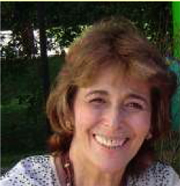 |
| |
|
|
Selected Major Books of Johan Galtung |
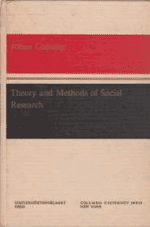 |
A5. Theory and Methods of Social Research
(1967, 534 pp.) |
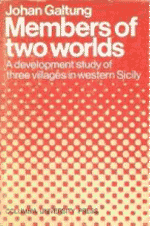 |
Members of Two Worlds;
A Development Study of Three Villages in Western Sicily
(1971). |
| |
|
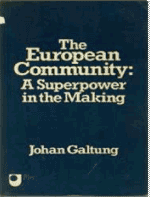 |
A9. The European Community:
A Superpower in the Making
(1973, 194 pp.) |
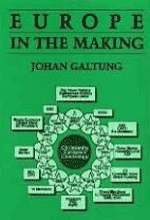 |
Europe In The Making
(1989) |
| |
|
|
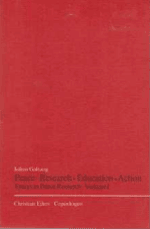 |
A15. Peace: Research - Education - Action.
Essays in Peace Research I
(1975, 405 pp.) |
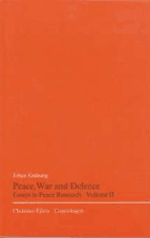 |
A17. Peace, War and Defense.
Essays in Peace Research II
(1976, 471 pp.) |
| |
|
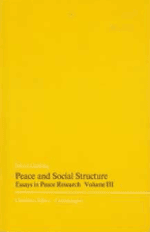 |
A21. Peace and Social Structure.
Essays in Peace Research III
(1978, 564 pp.) |
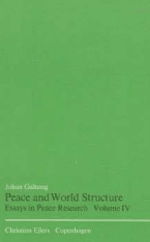 |
A25. Peace and World Structure.
Essays in Peace Research IV
(1980, 736 pp.)) |
| |
|
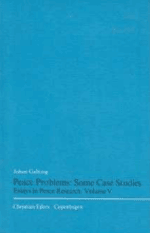 |
A26. Peace Problems: Some Case Studies.
Essays in Peace Research V
(1980, 491 pp.) |
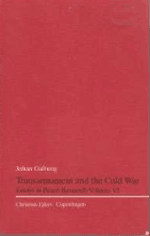 |
A42. Transarmament and the Cold War.
Essays in Peace Research VI
(1988, 433 pp.) |
| |
|
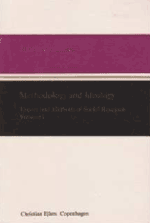 |
A20. Methodology and Ideology.
Essays in Methodology I
(1977, 271 pp.) |
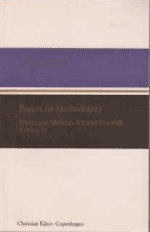 |
A24. Papers on Methodology.
Essays in Methodology II
(1979, 251 pp.) |
| ( |
|
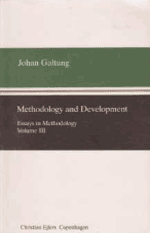 |
A41. Methodology and Development.
Essays in Methodology III
(1988, 260 pp.) |
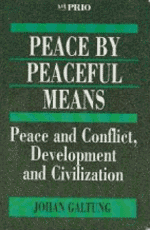 |
A57.Peace by Peaceful Means:
Peace and Conflict, Development and Civilization
(1996, 280 pp.) |
| |
|
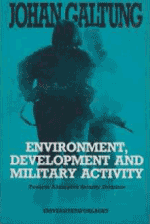 |
A31. Environment, Development and Military Activity:
Towards Alternative Security Doctrines
(1982, 142 pp.) |
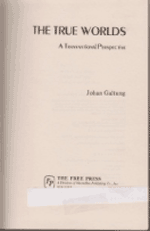 |
A27. The True Worlds:
A Transnational Perspective
(1980, 469 pp.) |
| |
|
|
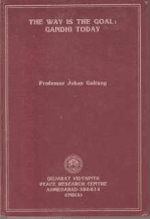 |
A38. The Way Is the Goal:
Gandhi Today
(1992, 224 pp.) |
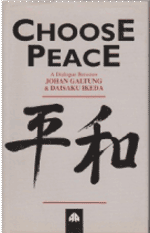 |
A55.Choose Peace:
A Dialogue Between Johan Galtung and Daisaku Ikeda
(1995, 172 pp.) |
| |
|
|
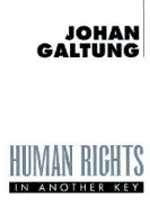 |
Human Rights in Another Key
(1994) |
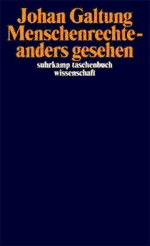 |
| Menschenrechte anders gesehen. |
| |
|
|
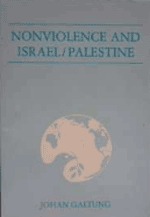 |
Nonviolence and Israel/Palestine
(Institute for Peace) 1989 |
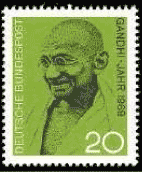 |
Der Weg ist das Ziel.
Gandhi und die Alternativbewegung
Peter Hammer Verlag GmbH
(February1990) |
| |
|
|
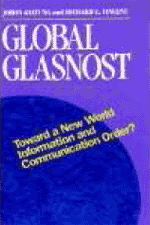 |
Global Glastnost:
Toward a New World Information and Communication Order?
by Johan Galtung and Richard C. Vincent
(Hampton Press Communication) (Aug. 1992) |
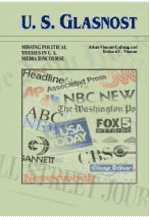 |
U.S. Glasnost: Missing Political Themes in
U.S. Media Discourse
by Johan Galtung & Richard C. Vincent (Authors)
(Hampton Press Communication Series) (2004) |
| |
|
|
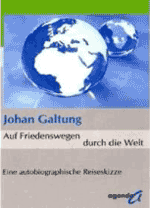 |
Auf Friedenswegen durch die Welt:
Eine autobiographische Reiseskizze
Johan Galtung (Autor), Britta Steinkamp (translator)
(2006) |
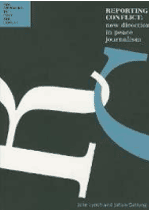 |
Reporting Conflict:
New Directions in Peace Journalism
(New Approaches to Peace and Conflict)
by Jake Lynch & Johan Galtung (Authors),
2010) |
| |
|
|
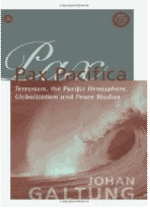 |
Pax Pacifica: Terrorism, the Pacific Hemisphere,
Globalization, and Peace Studies
(Constructive Peace Studies) (2005) |
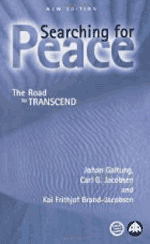 |
Searching For Peace:
The Road to TRANSCEND
(Critical Peace Studies)
by Johan Galtung, Carl G. Jacobsen,
Kai-Frithjof Brand-Jacobsen (Authors) |
| |
|
|
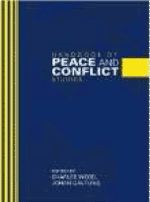 |
Handbook of Peace and Conflict
ed. By Charles Webel and Johan Galtung
(2007) |
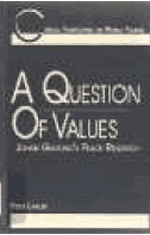 |
A Question of Values:
Johan Galtung's Peace Research
(Critical Perspectives on World Politics)
by Peter Lawler |
| |
|
|
| |
 |
|
| |
|
|
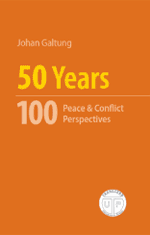 |
A75. 50 Years:
100 Peace and Conflict Perspectives
(2008, 263 pp.) |
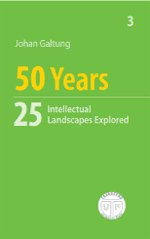 |
A76. 50 Years:
25 Intellectual Landscapes Explored
(2008, 250 pp.) |
| |
|
|
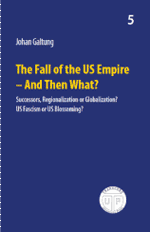 |
A78. The Fall of the US Empire –
And Then What?
(2009, 268 pp.) |
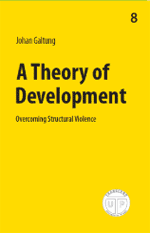 |
A80. A Theory of Development:
Overcoming Structural Violence
(2010, 283 pp.) |
| |
|
|
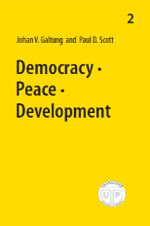 |
C22. (With Paul D. Scott)
Democracy • Peace • Development
(2008, 308 pp.) |
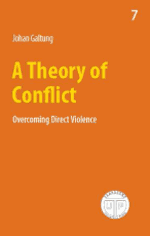 |
A79. A Theory of Conflict:
Overcoming Direct Violence
(2010, 320 pp.) |
| |
|
|
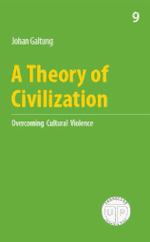 |
A84. A Theory of Civilizations:
Overcoming Cultural Violence
(2013, forthcoming) |
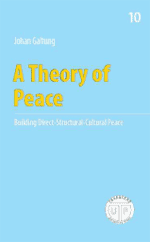 |
A85. A Theory of Peace:
Building Direct, Structural and Cultural Peace
(2013, forthcoming) |
| |
|
|
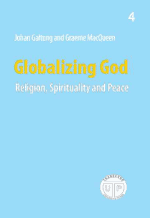 |
C23. (With Graeme MacQueen)
Globalizing God
(2008, 254 pp.) |
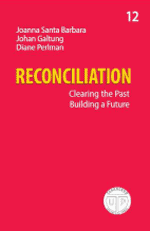 |
C30. (with Joanna Santa Barbara, and Diane Perlman)
Reconciliation:
Clearing the Past, Building a Future
(2012, 213 pp.) |
| |
|
|
| |
 |
|
| |
To order, please visit http://www.transcend.org/tup, where you can also find brief book descriptions, tables of contents and reading samples. |
|
| |
|
|
On Johan Galtung |
| |
|
|
|
|
|
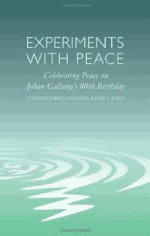 |
Experiments with Peace:
Celebrating Peace on Johan Galtung’s 80th Birthday
by Jorgen Johansen, John Y. Jones (Editors)
(2010)
|
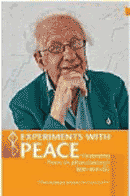 |
Experiments with Peace:
A Book Celebrating Peace on Johan Galtung’s 80th Birthday [Englisch]
J. A. Rgen Johansen, John Y. Jones (Eds.),
Archbishop Desmond Tutu , Narayan Desai (Autors) et al.
(2011) |
| |
|
|
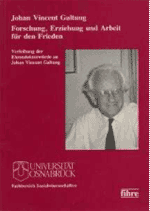 |
Johan Vincent Galtung.
Forschung, Erziehung und Arbeit für den Frieden:
Verleihung der Ehrendoktorwürde des
Fachbereiches Sozialwissenschaften der Universität Osnabrück
by György Szell, Dieter Kinkelbur (Editors) |
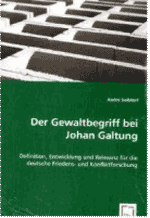 |
Der Gewaltbegriff bei Johan Galtung
by André Soßdorf
(2008) |
|
|
| |
|
|
|
|